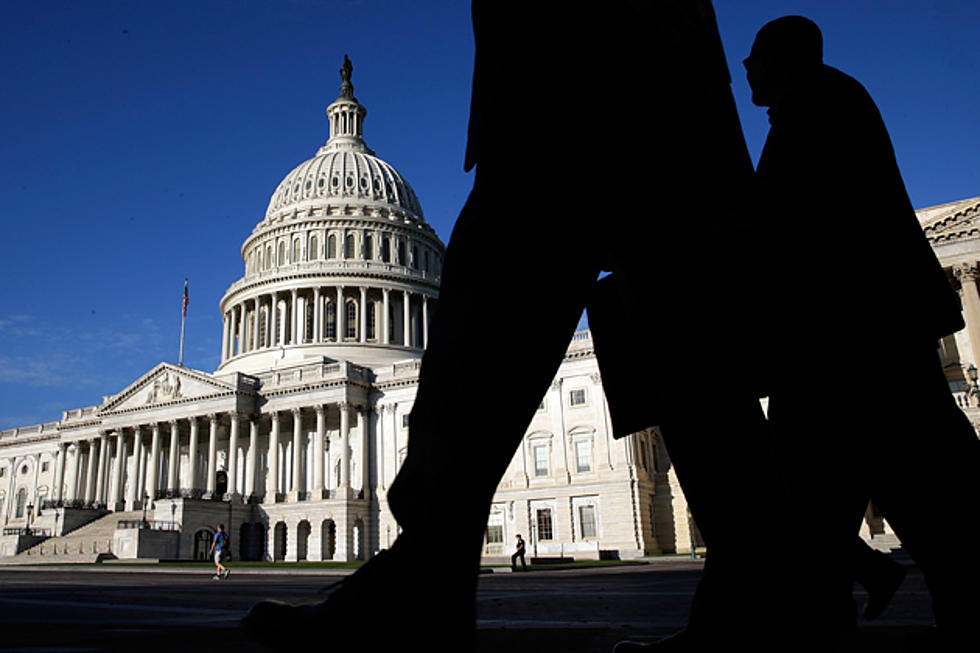
How Would a Government Shutdown Impact Central New York?
The government is careening toward a shutdown and that could have disastrous ripple effects across Central New York.
If Congress fails to pass a budget to fund the federal government by October 1, many operations will cease to operate.
Political infighting is tying up passage of a spending deal. The House and Senate have until the end of the day on Saturday to avert a government shutdown.
Senate Majority Leader Chuck Schumer released a statement about who will be affected and which departments will grind to a halt if that happens.
He lambasted:
We cannot afford to let the extreme fringe views of the House Republican Conference risk a government shutdown and needlessly hurt New York families. From Syracuse to the Southern Tier to Suffern, New York House Republicans have a responsibility to their constituents to stand up to House leadership and work in a bipartisan way to fund the government.
He said millions of New Yorkers and the services many rely on will cease operations.
Furloughs and Working Without Pay
Federal workers will either work without pay or will have to take immediate unpaid leave until a spending deal is passed.
If the government shuts down, the majority of DoD civilian employees working on military installations such as Form Drum, West Point, and Watervliet Arsenal will be furloughed and go on unpaid leave immediately. Additionally, 41,624 active duty and reserve personnel across New York will be expected to show up for work, serving their country without pay.
Members of the military will also lose access to critical services. Said Schumer, they will be unable to take advantage of "critical mental health services, recreational activities, sporting events, and other services not deemed as essential" amid the shutdown.
Additionally, he said, "Elective surgery and other elective procedures in NY DoD medical and dental facilities are likely to be discontinued during a shutdown."
Roughly 95 percent of all Transportation Security Administration agents will also have to work without pay. Those affected include, "Transportation Security Officers, Canine Handlers, Federal Air Marshals, Transportation Security Inspectors, Explosives Experts, Intelligence & Vetting Analysts, cybersecurity specialists and more."
Schumer warns this will cause severe delays at airports across the state, such as Buffalo Niagara International, Albany International, and Syracuse Hancock International.
A shutdown will cause significant delays and longer wait times for the 84,613 people who fly through New York airports every day, as there were during previous shutdowns, with hiring and new training freezing and exacerbating shortages.
The likelihood of flight delays will increase, but could be worse than what passengers experienced in 2019 due to the TSA worker and air traffic controller shortages.
How It'll Impact Businesses
Schumer warns that a shutdown will impact food and workplace safety, which should concern New Yorkers.
The Food and Drug Administration could be forced to delay food safety inspections for seafood, meats, fruits vegetables, and other products putting extra pressure on restaurants and grocers.
He added OSHA will have to limit its inspections, in addition to the Department of Labor investigations being suspended.
Infrastructure projects will also become snared. Schumer explained environmental reviews from the EPA and DOI will be delayed, in addition to "severe disruptions to the permitting process across federal agencies."
Schumer also said during a shutdown, there will be "no USDA loans or grants would be made for modernizing utilities infrastructure in rural New York."
Additionally, the shutdown will impact business seeking loans from the Small Business Administration because processing for most SBA lending programs will cease during a shutdown.
These programs provides $1,298,267,900 in funding to small businesses in New York every single year. NY businesses looking to hire new employees during the shutdown will also run into problems, due to federal E-Verify access – an internet-based system that allows businesses to determine their employees’ eligibility to work in the United States – being suspended.
The state's small contractors will also feel additional pressure due to federal contractors in New York facing stop-work orders and delayed payments for all projects if a shutdown begins.
Lastly, national parks and historic sites will shutter amid a shutdown, thus denying critical tourism dollars to municipalities.
Over 16 million tourists visit national parks in New York every year and could be turned away or unable to fully access parks, monuments, and museums if the government shuts down.
Read More: A Record Number of Tourists Visited Central New York
NY farmers and ranchers will also face hardship as they will be unable to assistance loans amid a shutdown. The timing is ill-opportune because it is in the middle of harvest season.
He added, "These farm loans provide $53,347,000 in funding for farmers in New York every year."
Benefits That Will Cease
Schumer says among the myriad of programs that will cease operation amid the shutdown include the Special Supplemental Nutrition Program for Women, Infants, and Children (WIC), which serves 418,000 New Yorkers.
This includes 89,717 women, 241,198 children, and 87,169 infants across NYS who would soon start being turned away at grocery store counters, with a federal contingency fund drying up after just a few days.
Also SNAP benefits could be taken away from 2.9 million households across the state if the shutdown lasts longer than the month of October.
Schumer also announced, "Federal Housing Administration (FHA) program that provides loans for families to buy homes will cease entirely."
Chaos at the Border
Schumer also warned that a shutdown will affect the security at the North and Southern Borders.
Without a funded government, critical Border Patrol agents and CBP officer hires aimed at alleviating serious staffing shortages at our northern border and local ports of entry would not be onboarded during the month of October or longer, crippling efforts to bring increased security to the border.
This would set back efforts at the border, as 80 percent of border enforcement personnel will lose pay despite continuing work.
Additionally, deployments of our most effective technology to interdict fentanyl and contraband at ports of entry where the vast majority of drugs enter the U.S. would be delayed during shutdown, setting back our long-term efforts to combat lethal opioids.
In short, Schumer is hoping a last minute deal can be made before the clock strikes midnight on September 30.
Do you think our political leaders will be able to put their differences aside and come up with a deal?

6 Tips To Survive 'Record Inflation' in New York
More From WIBX 950









